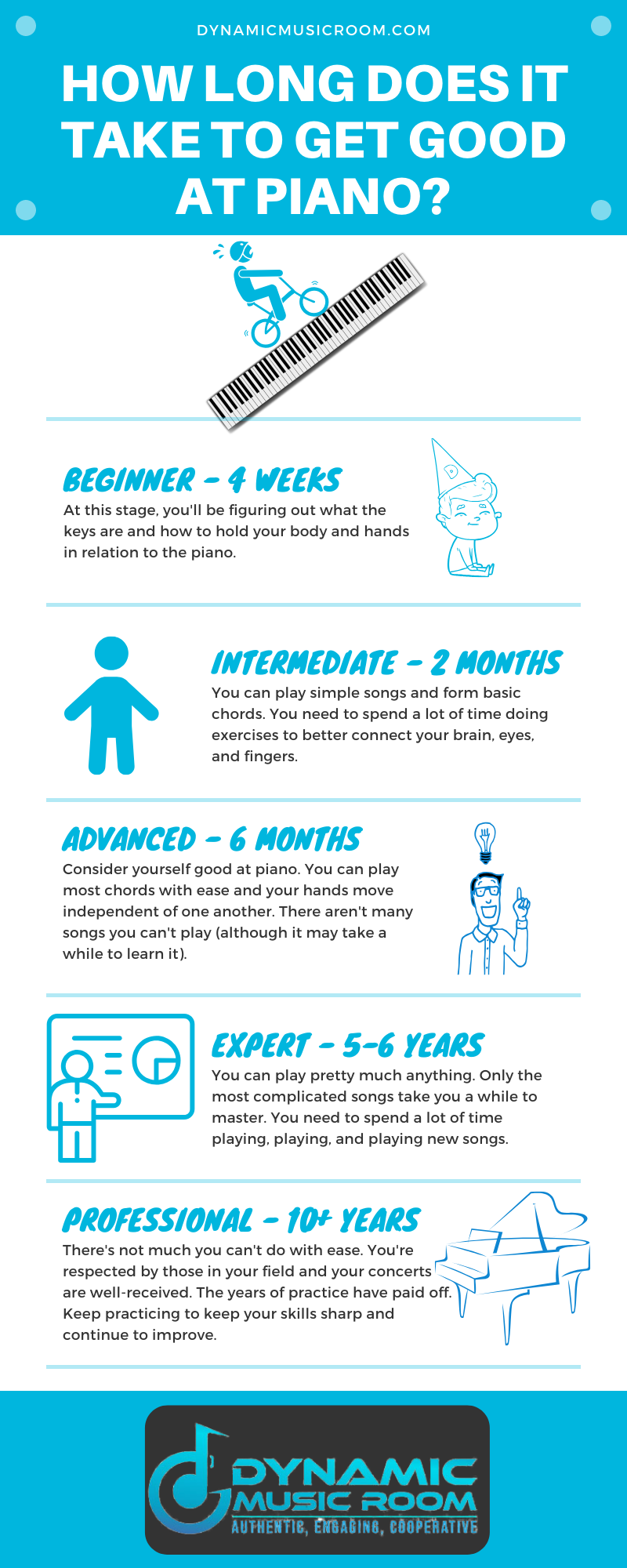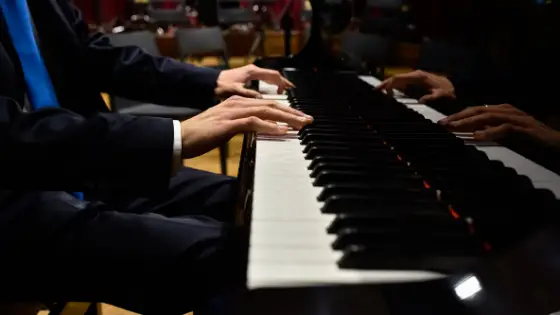You’re thinking about getting into the piano game, but you’re not sure what kind of commitment you’re making.
Maybe you’re a total beginner and wondering if it’s even possible for you to learn piano.
As a music teacher and private lesson teacher, I’ve been asked some variations of this question many times:
How long does it take to get good at piano?
It depends on your definition of “good.” Based on what most people imagine as good, I usually ball-park 6 months of consistent practice with solid teachers or programs to gain enough technical ability to consider yourself good.
In this article, I’ll dig into the factors that determine how successful you’ll be at learning piano and go into how long it takes to learn piano for each level.
Learn about when to start piano lessons.
Need some help on piano? Check out Flowkey with their easy-to-follow lessons and literal thousands of songs with learning tools.
I’ve been playing music for almost 20 years now, and I still use it to help me learn new songs (and it’s fun too!).
Table of Contents
Ask Yourself The Level You Want To Be
The first question we need to ask is: what is considered “good” on piano?
Are you looking for how long it takes to master piano at a professional level?
Maybe you just want to play your favorite pop song on piano.
All of this is largely subjective. A classically trained pianist will look at a professional jazz pianist and think they’re pretty good, but not amazing. The same is true vice versa.
Some people will dive into this for hours and hours, but I’ll break piano skill down into 5 main levels.
Note: I am NOT a professional or even expert player myself. I’d consider myself somewhere around advanced.
But these groups are based on my experience as a musician and discussion with expert and professional level piano players.
Beginner
The beginner level is the first level of piano playing. These are people who can play a simple melody in their right hand and hold chords in their left hand.
The chords aren’t moving, and the hands don’t truly move independent of one another.
You may know a few I, IV, V, and V7 chords in a few common keys. You’re becoming quite adept at five-finger exercises.
You’re starting to memorize the piano keys.
Intermediate
Intermediate piano players can play many songs. They are comfortable breaking up chords into different patterns.
They know the fingering exercises for scales in common keys and know intellectually how to follow through with the other keys.
They’re comfortable with how the notes on the staff line up with what they’re playing.
The hands are beginning to develop independence from each other.
Sight-reading piano music is difficult, but the intermediate player will know how to go about learning a new piece.
You know what the black keys are.
Advanced
This is where I think most people would consider your having achieved “good” piano playing.
The piano player is comfortable playing scales and arpeggios in all keys both major and minor.
This player is easily familiar with how fingerings work on sheet music and will be able to improvise basic harmony and chords with a right-hand melody.
An advanced player sight-reads simple pieces with relative ease. They also know how to play fairly complicated songs, though it takes them a while to learn it.
The hands are independent of one another, but the advanced players will still struggle with higher-level techniques such as hands crossing often and wide ranges as well as the hands needing to jump all over the piano.
Expert
The expert piano player has been working on their technical skills a lot. They play any keys and any number of exercises with ease.
Sight-reading simple songs is a breeze and more complicated works take a few practices before it’s clean.
They pick up songs quickly and are able to improvise off of melodic ideas. When they improvise, it sounds like they intended the song to be that way from the beginning.
Expert players have mastered a number of complicated songs. They also have played some of the highest difficulty piano pieces.
Many successful popular musicians and/or undergraduate piano students are at this level.
Professional
The main difference between expert and professional players is time and repertoire. It’s usually at this level the pianist specializes in a style or genre.
These pianists do all the expert things on an even higher level. The list of songs they know and can play is massive.
They’ll probably have many of the highest difficulty songs under their belt. Most people watch experts and wonder how they ever managed to play this way.
When people watch these piano professionals, they’re equally impressed but also emotionally touched.

Factors Affecting How Long It Takes To Learn Piano Well
All the numbers in the next section are completely subjective on a number of factors. This section talks about the ones I think are most important to consider.
There are obviously more than these out there, but these are the ones I find most important.
Attitude
The first and most important factor is attitude. Do you expect to struggle?
Are you OK with being bad for a long time?
You must be able to accept these things as part of the learning process.
Don’t think: I’m bad at piano.
Think: I have so much to learn. Look how far I’ve come.
Who Are You Learning From?
How are you improving? There are many ways to learn piano, but some are better or worse than others.
I’ll briefly go over the most common methods for learning:
Private Lessons – These are usually the most effective. Your teacher will guide you through improvement and give feedback on how you need to improve.
These are usually more expensive, and it really depends on the teacher how much you improve.
Group Classes – Taking a group class through a university or music store is another good option. It’s sometimes a little cheaper than a private lesson, and you still get feedback from the teacher.
You won’t get as much feedback as private lessons, and you’ll often be stuck in the progress of the whole class.
Piano Books – There are hundreds of piano books out there to follow. You may use them as part of your private or group classes.
Doing them on your own is OK, but they aren’t usually designed to handle self-directed learning.
YouTube – It’s fine to learn from YouTube, and there are a lot of good videos out there breaking down songs and techniques.
But this is the most ineffective way to improve.
Online Piano Programs – Online piano programs have improved greatly over the years. In my experience, some of them have reached the level of group classes.
One of the best ones out there is Flowkey. Check it out for free!
Need some help on piano? Check out Flowkey with their easy-to-follow lessons and literal thousands of songs with learning tools.
I’ve been playing music for almost 20 years now, and I still use it to help me learn new songs (and it’s fun too!).
In all honesty, the best way is to get a private teacher and supplement with an online program.
But if the price of a teacher is too much, you need to go with a program in order to improve consistently and completely.
How Long Do You Practice?
Practicing is key to improvement, but you need to spend the right amount of time practicing. In the early stages, it’s OK to practice for 10-15 minute periods a couple of times per day.
You need to spend at least 30 minutes practicing over the course of the day. Less than this won’t show much progress.
How Often Do You Practice?
Practice frequency is more important than practice length. Someone who practices 30 minutes, 5 days per week will improve faster than someone who practices 2.5 hours one day per week.
Your goal should be practicing every day, but this is unrealistic in most cases. Aim for at least 5 days per week.
What Are You Practicing?
What you practice is also important. It may be more fun to play a song you’re good at for 30 minutes, but you won’t improve as much.
Your practice sessions should include at least 4 parts:
- Technical exercises (scales, arpeggios, etc)
- New material learning
- Known material mastery
- Playing by ear (finding songs on your own)
Focusing on one over any of the others will limit you in the long run.

How Long Does It Take To Learn To Play The Piano By Level
In this section, I’ll go over how long it takes to learn to play piano by level. These numbers aren’t hard and fast rules by any means, but it may give you an idea of what needs to be done in order to get this far.
Keep the above factors in mind as these will dramatically affect the length of time it takes to improve.
Beginner Level
To reach beginner level usually takes around 4 weeks. This is, of course, assuming they’re practicing well and following a program.
It’s actually at this level I most strongly recommend learning from a teacher or really good program.
Bad habits are hard to break, so catching them ahead of time is key.
At this level, you’ll probably feel amazed you’re able to play anything on piano at all. It’s quick to get to this level, and fairly quick to move out of it.
With beginners, the focus is on posture and understanding how the keys work and where they even are.
Intermediate Level
From knowing nothing, I would expect it to take 2 months to get to an intermediate stage. Keep in mind the factors from above which determine how quickly you improve.
Honestly, this is what my students and most people find to be the most frustrating stage. It can feel like you’re not making progress.
You begin to see how things work on piano, but your fingers, eyes, and brain aren’t just coordinated yet.
Worse, you become bored with how your playing is so simplistic, and the exercises you need to do won’t satisfy you at all.
Stick with it!
This is the hardest stage to get through mentally. You’ll be doing a lot of exercises to improve your technical ability, but keep your eyes on the prize!
Once you’re out of this stage, everything gets much more satisfying. Trust me!
At this stage, you must still learn from a teacher or a really good program.
Advanced Level
The advanced level of piano players takes around 6 months to get to. The advanced stage is also the longest of the stages for most people.
It’s where most people (including myself) end up and spend their time.
Fortunately, people in the advanced stage can play most piano songs, it just takes longer to learn them.
At this stage, you’re working on expanding your technique, note reading, ear training, and song list.
Expect to spend a long time at this level. But the good news is, at this point, you can just learn by playing new songs and take some courses.
This is where most people are considered good at piano.
Expert Level
To reach expert level, it largely depends on your teacher and time spent learning. It’s difficult to reach this level without a teacher, but it’s possible with dedication.
For most people, it will take 5-6 years or more to get there.
Even with many years of experience, it takes consistent practice and a solid plan to improve.
Once you reach this stage, it’s all about improving repertoire and getting as much experience as possible by playing many songs to a high level.
This level is considered elite, and few reach this level. These would be really successful popular musicians known for their instrumental playing (think Elton John or John Baptiste).
Many Masters or above level jazz pianists and classical pianists would qualify for this as well.
I would consider this to be piano mastery. So how long does it take to master piano? 5-6 years of dedicated practice.
Professional Level
The highest professional levels are difficult for many to reach. It takes years of practice at an undetermined amount to reach this stage.
For some, they’ll reach it as soon as they reach the expert level. For others, they’ll reach after 10 years or never.
Expect to only get here as early as 10 years of dedicated practice and instruction.
Final Thoughts
I hope you found this guide to how long it takes to get good at piano helpful. It largely depends on your skill goals and how much time and work you’re able to put in.
A lot of your piano skill growth is also dependent on the resources you use. The most effective is going to be a combination of private lessons and a dedicated learning program such as Flowkey.
Flowkey is different from most online piano programs because of its practice tools, courses, and massive song list all for an affordable monthly price.
This link is affiliate in nature which means I earn a small commission if you end up signing up for the paid program. You can just use the free one too, but I think once you try it out, you’ll like it!
Commonly Asked Questions
How Good Can You Get At Piano By 1 Year?
With one year of serious practice, you can expect to be on the edge of leaving the beginner level or joining the ranks of the intermediates. Obviously, the form of learning and consistency of your practice makes a big difference.
The more you practice and the more specific feedback you get, the faster you’ll get better.
Your level of experience with other areas of music makes a difference too.
When I first picked up the piano, I already had four years of experience playing the trumpet in the band.
The music reading, music theory, and ear training learning the instrument gave me made a big difference in how quickly I learned.
Getting a good piano teacher is still the best and fastest way to improve.
Still, let’s be realistic: you won’t reach a concert pianist level in a year.
But you will get a lot better!
Can I Learn The Piano At 30?
Adult beginners can learn just as well as younger students. An adult beginner will often struggle more with motivation and frustration at a lack of speed in their progress, but they can learn too!
If it’s your first time learning a musical instrument, you need to combat a lack of motivation.
Pick some pop songs you like and find a good teacher (one who understands adults who just want to play for fun!).
Don’t just give the piano away! Although, if you want to donate a piano, we have a guide on that too.
Is Piano Harder Than The Guitar?
The piano and guitar are both hard in their own ways, but most people find the piano to be more difficult. The piano requires two active hands and has very difficult music early on. Guitars are tougher at first to press those strings down and get a good sound.
There are more difficult pieces in classical music with the piano than those on guitar, but there are a number of complex pieces for guitar as well.
Both take hours of practice and a lot of hard work.
If you’re an adult learner trying to decide between the two, the important thing is your interest.
Pick the one you like the most that sound great with your favorite songs.
There are easy songs on both, and both instruments require a lot of finger strength and muscle memory.

